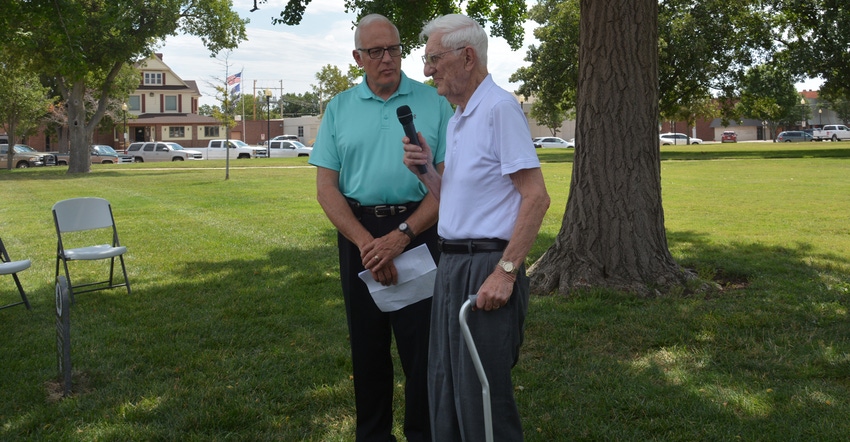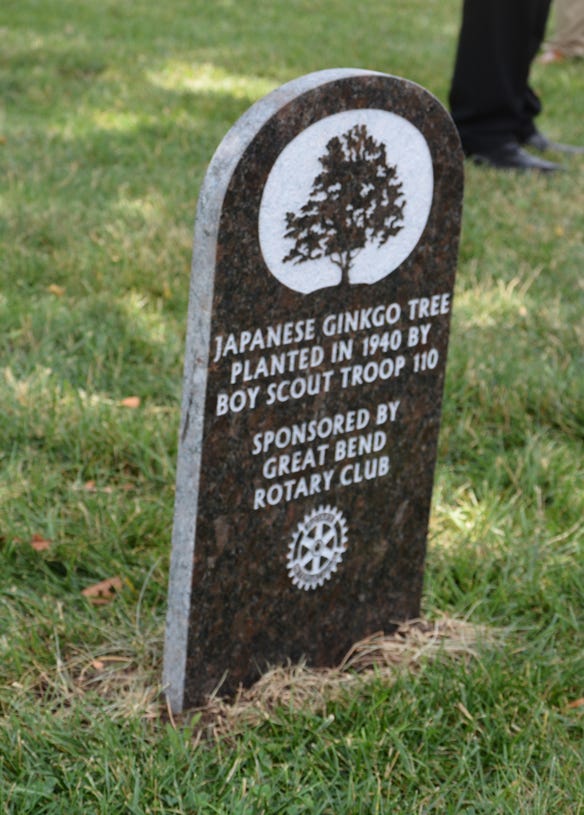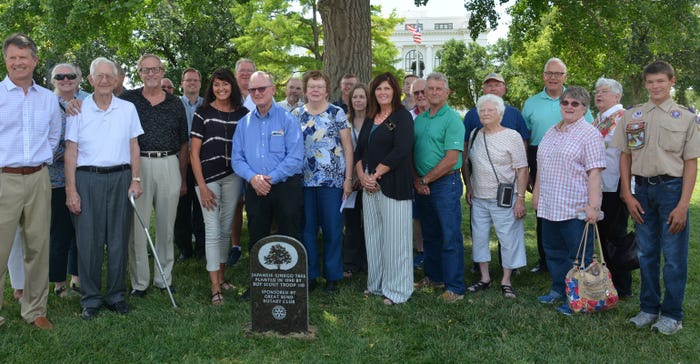August 16, 2018

One of the things I love best about small-town Kansas is that small things are big events.
Sometimes it is cultural heritage being celebrated, such as Kolache Days in Wilson. Sometimes it’s harvest, such as the Wheat Festival in Wellington; or it's history, such as the Chisholm Trail Festival in Caldwell. Sometimes it’s holidays or anniversaries of big events. It might even be a celebration of survival, like the 150th anniversary of Cuba and its celebration of both Czech heritage and harvest.
Monday, Aug. 6, was one such day in Great Bend.
Most Americans probably gave little thought to the fact that Aug. 6 was the 73rd anniversary of the bombing of Hiroshima. For the Rotary Club of Great Bend, though, it was a day worth noting. Rotary President Lee Musil found a way to combine it with the celebration of "Year of the Tree," which is the 2018 Rotary theme.
The Rotary Club decided to support the Year of the Tree with a special dedication of a unique tree that was planted by Boy Scout Troop #110 in 1940 on the north side of the courthouse square as part of a national tree-planting effort that came in the wake of the Dust Bowl.
 STONE MARKER: The dedication of the Japanese gingko tree on the courthouse square in Great Bend included the erection of a stone marker to let future visitors know that the tree is a piece of city, Boy Scout and Rotary history.
STONE MARKER: The dedication of the Japanese gingko tree on the courthouse square in Great Bend included the erection of a stone marker to let future visitors know that the tree is a piece of city, Boy Scout and Rotary history.

Ginkgo trees were an essential part of that planting effort because they have a long history of survival in the harshest conditions. A ginkgo tree can live for more than 1,000 years. They grow well in poor soil, and they are resistant to summer drought and winter salt. Ginkgo leaves have been found in fossils more than 270 million years old.
That history of resilience is what connects the ginkgo to Hiroshima. In the wake of the historic drop of the first atomic bomb, the gingko trees of Hiroshima were severely burned. But they were not killed. In time, they came back, leafed out with their unique fan-shaped leaves, and still grow in Hiroshima. The anniversary of the bombing seemed the perfect day to celebrate the planting of a hometown gingko tree.
Three ginkgo trees were planted in Great Bend five years before Hiroshima, and all survive today. One stands at the corner of 16th Street and Jackson, one is at 2611 North Broadway and the other is the newly-dedicated tree on the courthouse square. The gingko trees were three among 63,000 seedlings that were ordered by Great Bend to be planted around the community.
History is important in small-town Kansas. So are historical figures. On gingko tree dedication day, there was an opportunity for Franklin Reinhardt, a long-time Great Bend optometrist, to speak a few words. Reinhardt is the sole surviving member of Troop #110 boy scouts who planted the tree.
Reinhardt said the troop planted the tree not for themselves, but for their grandchildren and great grandchildren who today can play in the spreading shade of the stately tree. Leaning on a cane to help keep his balance on the turf, Reinhardt spoke with pride about being an Eagle Scout, a Kansan and a Rotarian.
Roger Marshall, a Great Bend native and a member of the Rotary Club, was on-hand for the tree dedication, which included the placement of a stone marker. He serves in Congress as representative from the Big First district of Kansas, the largest agricultural district in the nation.
His words on the dedication were not about politics, but about Rotary, service, and remembering history and those who serve history, such as Franklin Reinhardt.
Marshall said the dedication of the gingko tree is a way to remember Hiroshima and the horrors of war, and to commemorate the lives that were lost that day.
 EVERYBODY IN THE PICTURE: Rep. Roger Marshall (left), a member of the Great Bend Rotary Club, attends the dedication of a Japanese gingko tree. The tree, planted by the Boy Scouts inn 1940, is now a giant, spreading shade tree. The dedication ceremony was held on Aug. 6, the anniversary of the dropping of the atomic bomb on Hiroshima, in honor of the lives that were lost that day. When it was time for a photo op, it was everybody in.
EVERYBODY IN THE PICTURE: Rep. Roger Marshall (left), a member of the Great Bend Rotary Club, attends the dedication of a Japanese gingko tree. The tree, planted by the Boy Scouts inn 1940, is now a giant, spreading shade tree. The dedication ceremony was held on Aug. 6, the anniversary of the dropping of the atomic bomb on Hiroshima, in honor of the lives that were lost that day. When it was time for a photo op, it was everybody in.

He ended with a reminder of the causes of Rotary: to support world peace, fight disease, promote clean water and sanitation, ensure health care for women and children, support education, and grow local economies.
It was also a way that Great Bend, and communities all across Kansas, connect with the outside world in their inside way. History is personal in small-town Kansas. It is the names carved in granite or bronze on the World War I, World War II, Korean, Vietnam, Desert Storm and Iraq war memorials in "veterans parks" across the state.
It lives in the shops and bakeries and traditions of summer festivals. It is not about the world event but about "our" part in it.
The world needs more of this spirit, and America needs more reminders that every great event of history is made up of all the little towns and their sons and daughters who made those great events happen. America has always been about us, the individual people to whom it matters. It matters still. That’s worth thinking about.
You May Also Like




